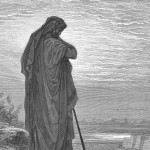by Fr. Patrick Henry Reardon
 Most of us are so accustomed to finding the prophetic books included in the Bible that it is perhaps difficult to appreciate the significance of their inclusion. Although the Israelites seem always to have had their prophets—Nathan, Elijah, and so on—literary works of prophecy did not make their appearance until the eighth century before Christ, and their inclusion in the canon of Holy Scripture came later yet.
Most of us are so accustomed to finding the prophetic books included in the Bible that it is perhaps difficult to appreciate the significance of their inclusion. Although the Israelites seem always to have had their prophets—Nathan, Elijah, and so on—literary works of prophecy did not make their appearance until the eighth century before Christ, and their inclusion in the canon of Holy Scripture came later yet.
The sudden emergence of the literary prophets was an extraordinary phenomenon. Although its origins are mysterious, we do know it was tied to the political and social turmoil in the western half of the Fertile Crescent near the middle of the eighth century.
Around 765 B.C.-as though out of nowhere-the shrine at Bethel was suddenly shaken by the voice of Amos, roaring like a lion (Amos 1:2; 3:8; 5:19). Not only was the voice arresting; his words poured forth in eloquent, unrelenting cadences of condemnation. Amos began,
“Thus says the Lord, ‘For three transgressions of Damascus, and for four, I will not relent.'”
Then, after naming the sins of the Syrians, the prophet proceeded to list the offenses of the other peoples surrounding the Holy Land: Philistines, Phoenicians, Edomites, Ammonites, and Moabites.
This spirited exercise in high rhetoric seized the attention of the Israelites. They surely felt in agreement with the message; it was probably gratifying to listen to this catalogue of the sins of pagans. Nor were the listeners bothered much when the prophet, finishing with the pagans, turned his attention to the fraternal kingdom just to the south of Bethel:
“For three transgressions of Judah, and for four, I will not relent.”
Yes, very good, Amos, pour it on those sinners!
The prophet was not finished, however. Quite abruptly, just when the worshippers at Bethel imagined the oracle to be over, Amos pronounced on the subject of sin one more time:
“For three transgressions of Israel, and for four, I will not relent.”
Now, it seemed to his listeners, the prophet had turned from preaching to meddling! Indignation followed (7:10-13).
We do not know who wrote down the prophecies preached by Amos, though it may have been the prophet himself. The fact of it, however, is of enormous significance, because it implied that the prophet’s message was perceived to bear dimensions of meaning transcendent to the original circumstances in which he preached it.
Perhaps several impulses prompted this effort to preserve the prophecies. One, I suspect, was a cultured appreciation of the prophet’s rhetorical art; Amos was undeniably eloquent. So those Israelites who took his words seriously were very disposed to record them.
In addition, the credentials of Amos were strengthened when he foretold certain events that would soon come to pass. For example, he predicted the solar eclipse that occurred on June 15, 763 (cf. Amos 8:9). He may also have foretold the earthquake that happened two years after he began to preach (1:1. Archeologists date the earthquake between 765 and 760.). Most of all, however, Amos prophesied the downfall of Samaria and the deportation of its people (5:5, 27; 7:11, 17; 9:4). When this came to pass a generation later—in 722, under the Assyrian Emperor, Sargon II—Amos’s prophetic wisdom was established.
After that event, the prophecies associated with Amos were preserved in the south, in the Kingdom of Judah, and cherished by those who regarded him as a messenger of God. Other literary prophets appeared shortly after Amos, in both Israel and Judah: Hosea, Micah, and Isaiah. They shared with him, not only a high level of rhetorical and literary skill, but also a moral preoccupation with the political and social turmoil that attended the high tide of the Assyrian Empire. The transcription of the oracles of these men marked the beginning of an entirely new body of literature, a major feature of which was a deep concern for social and political justice.
In the history of man’s moral reflection, this literary development proved to be one of the most important. Although the eighth century prophets relied, explicitly at times, on the moral foundations established in the Torah, more often they appealed to a common sense of righteousness which they regarded as native to the human conscience. Starting with Amos’s warning to Syria, they addressed God’s Word to man’s moral sense.
